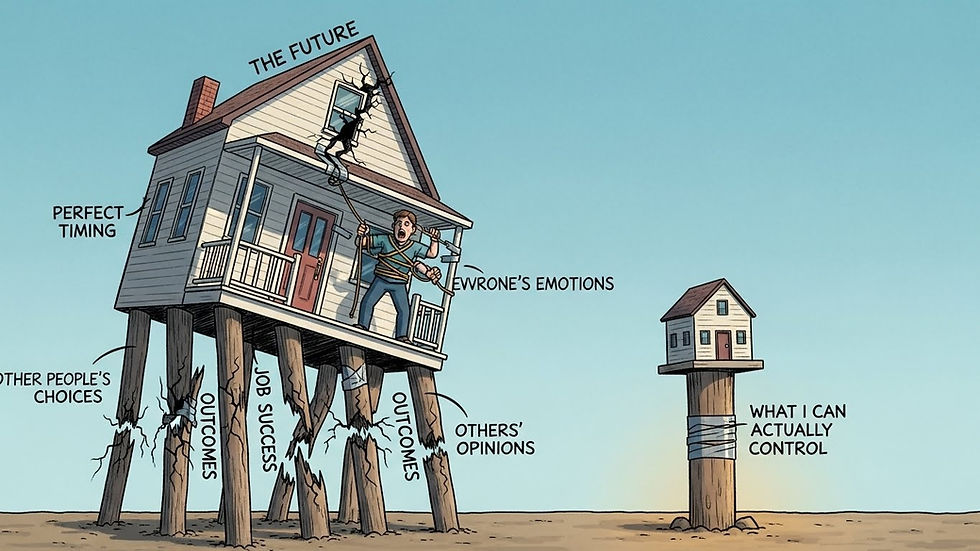Sleep and Mental Health: The Vital Connection We Often Ignore
- Natasha Bussey
- Mar 4, 2025
- 4 min read

In our quest for better mental health, we often focus on therapy, medication, or lifestyle changes like diet and exercise. Yet one of the most powerful influences on our psychological well-being is something we spend nearly a third of our lives doing: sleeping.
The Science of Sleep and Mental Health
Recent research has revealed just how deeply sleep and mental health are intertwined. A groundbreaking study published in JAMA Psychiatry followed over 10,000 individuals for five years and found that people with insomnia were 2.4 times more likely to develop depression compared to those without sleep problems [1].
Even more striking, a meta-analysis in Psychological Medicine examining 34 studies showed that treating insomnia with cognitive behavioral therapy for insomnia (CBT-I) led to significant reductions in anxiety and depression symptoms, even in patients who weren't specifically seeking mental health treatment [2].
How Sleep Affects Your Brain
The relationship between sleep and mental health works through several mechanisms:
Emotional regulation: Sleep deprivation amplifies activity in the amygdala (the brain's emotional center) while reducing connectivity to regions that regulate emotional responses [3].
Stress hormones: Poor sleep increases cortisol levels, creating a state of physiological stress that can trigger or worsen anxiety and depression [4].
Memory processing: During deep sleep, your brain processes emotional experiences, helping to reduce their negative charge. Without adequate sleep, emotional memories retain more of their distressing impact [5].
Brain cleaning: The glymphatic system—your brain's waste clearance mechanism—is primarily active during sleep, removing potentially harmful proteins and metabolites [6].
The Bidirectional Relationship
While poor sleep contributes to mental health problems, the relationship works both ways. Depression and anxiety often disrupt sleep patterns, creating a challenging cycle that can be difficult to break.
Research in Nature Communications used advanced statistical modeling to demonstrate this bidirectional relationship, showing that sleep problems predict future mental health issues and vice versa [7].
Practical Steps for Better Sleep
Maintain consistent sleep-wake times: Even on weekends, try to keep your schedule regular to support your body's natural rhythms. If you cannot fall asleep within 20 to 30 minutes, it’s recommended that you get up and read or listen to relaxing music somewhere other than your bed until you feel sleepy again before returning to bed.
Create a sleep-conducive environment: Keep your bedroom dark, quiet, and cool (around 65°F/18°C).
Establish a relaxing pre-sleep routine: Try reading, gentle stretching, or meditation 30-60 minutes before bed.
Limit screen exposure: Blue light from devices blocks the production of melatonin, which is responsible for feeling tired and sleep. Try to avoid screens 1-2 hours before bedtime. Wearing blue-light-blocking glasses for 2 hours before bed is another way to limit exposure.
Watch your consumption: Limit caffeine after noon and alcohol before bed, as both disrupt sleep quality. The half-life of a cup of coffee is about 6-8 hours, so if you drink a cup at 2 pm, then at 10 pm you will still have half a cup of coffee in your system. And certainly, attempt to eliminate drinking alcohol within 3-4 hours of bed time.
Consider CBT-I: If you struggle with chronic insomnia, cognitive behavioral therapy, specifically for insomnia, has been shown to be more effective than sleep medications for long-term improvement.
Sleep as Preventive Mental Healthcare
Perhaps most exciting is emerging research suggesting that improving sleep may not just treat existing mental health conditions but help prevent them from developing. A study published in The Lancet Psychiatry found that college students who received sleep improvement interventions showed significant reductions in anxiety, depression, and paranoia symptoms compared to a control group [8].
The Bottom Line
Sleep is not a luxury or a sign of laziness—it's a biological necessity for mental health. In our always-on culture, prioritizing sleep may be one of the most important things you can do for your psychological well-being.
If you're experiencing mental health challenges, addressing sleep problems could be a crucial part of your recovery. And if you're currently in good mental health, protecting your sleep may help you stay that way.
References:
1. Baglioni C, et al. (2021). Insomnia disorder and risk of mental disorders: A longitudinal, population-based study. JAMA Psychiatry, 78(6), 620-629. https://doi.org/10.1001/jamapsychiatry.2021.0429
2. Gee B, et al. (2019). The effectiveness of cognitive behavioural therapy for insomnia in improving psychological well-being: A systematic review and meta-analysis. Psychological Medicine, 49(8), 1253-1264. https://doi.org/10.1017/S0033291718001551
3. Simon EB, et al. (2020). Overanxious and underslept. Nature Human Behaviour, 4(1), 100-110. https://doi.org/10.1038/s41562-019-0754-8
4. Minkel J, et al. (2014). Sleep deprivation and stressors: Evidence for elevated negative affect in response to mild stressors when sleep deprived. Emotion, 14(1), 120-126. https://doi.org/10.1037/a0034777
5. Walker MP, van der Helm E. (2009). Overnight therapy? The role of sleep in emotional brain processing. Psychological Bulletin, 135(5), 731-748. https://doi.org/10.1037/a0016570
6. Xie L, et al. (2013). Sleep drives metabolite clearance from the adult brain. Science, 342(6156), 373-377. https://doi.org/10.1126/science.1241224
7. Freeman D, et al. (2020). The effects of improving sleep on mental health (OASIS): A randomised controlled trial with mediation analysis. Lancet Psychiatry, 4(10), 749-758. https://doi.org/10.1016/S2215-0366(17)30328-0
8. Yu B, et al. (2022). Bidirectional associations between sleep disturbances and mental disorders: A systematic review and meta-analysis. Nature Communications, 13, 3544. https://doi.org/10.1038/s41467-022-31034-8




Comments